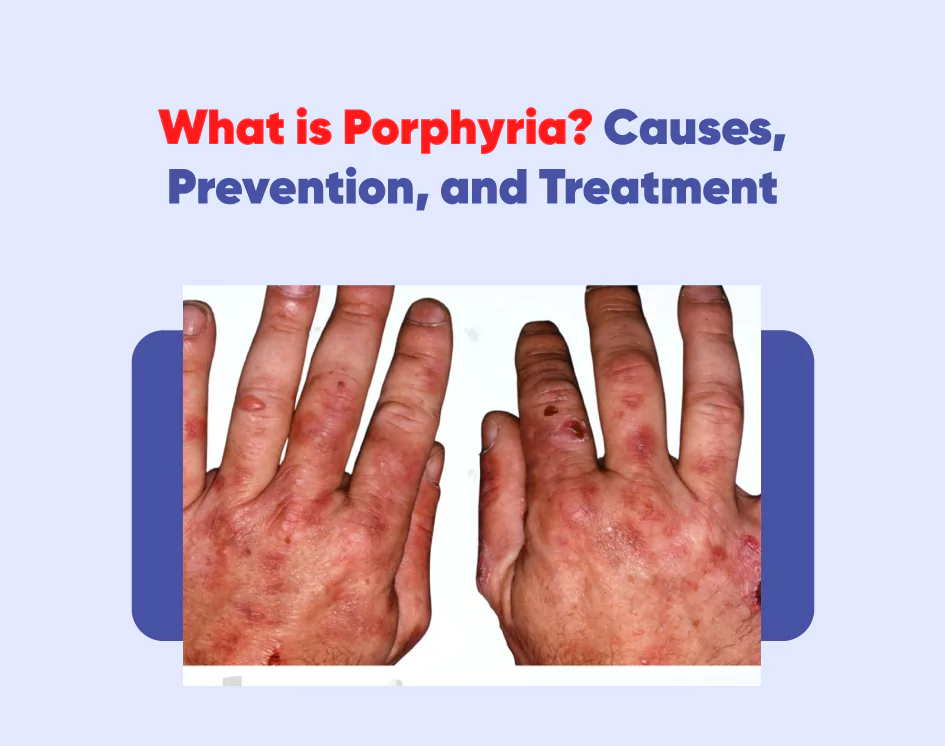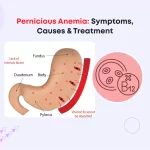
What is Porphyria? Causes, Prevention, and Treatment
Have you ever heard of a disease that can turn your urine purple, make your skin blister in the sun, or cause severe pain and mental confusion? If you have, you might be thinking of porphyria, a rare and mysterious condition that affects the blood and the nervous system. But what is porphyria exactly, and what causes it? How can it be prevented and treated? This article will answer these questions and more and help you understand this fascinating and complex disorder.
What is Porphyria?
Porphyria is the umbrella term for a group of disorders that result from a problem with the production of heme. This molecule contains iron and is essential for many functions in the body. Heme is mainly found in red blood cells, where it helps to carry oxygen to the organs and tissues. Heme also metabolizes drugs and hormones and forms bile and bone.
Heme is made from smaller molecules called porphyrins, produced in steps by eight different enzymes. If any of these enzymes are defective or deficient, porphyrins can accumulate in the body and cause various symptoms, depending on the type and severity of the enzyme defect. This is what happens in porphyria.
There are two main types of porphyria: they are acute and cutaneous. Acute porphyria affects the nervous system and can cause sudden and severe attacks of abdominal pain, vomiting, confusion, seizures, and high blood pressure. When exposed to sunlight, cutaneous porphyria affects the skin and can cause blisters, itching, and scarring. Some types of porphyria can affect both the nervous system and the skin.
What Causes Porphyria?
Most types of porphyria are inherited, meaning they are passed down from one or both parents to their children. The inheritance pattern can be autosomal dominant, autosomal recessive, or X-linked dominant, depending on the gene and the enzyme involved. Some people with a genetic mutation for porphyria may never develop any symptoms, while others may have mild or severe symptoms.
Some types of porphyria can also be acquired, meaning that they are not inherited but are caused by other factors, such as liver disease, iron overload, infections, or environmental toxins. These factors can trigger or worsen the symptoms of porphyria by interfering with the production or breakdown of heme.
Some common triggers of porphyria include:
- Alcohol
- Smoking
- Certain medications, such as antibiotics, anticonvulsants, or hormones
- Fasting or dieting
- Stress
- Sunlight
- Hormonal changes, such as menstruation or pregnancy
How Can Porphyria Be Prevented and Treated?
There is no cure for porphyria, but there are ways to prevent and treat the symptoms and complications. The prevention and treatment of porphyria depend on the type and severity of the condition, as well as the individual’s medical history and lifestyle.
Some general measures to prevent and treat porphyria include:
- Avoiding or minimizing the exposure to the triggers, such as alcohol, smoking, certain medications, fasting, stress, or sunlight
- Taking supplements or medications to replenish or reduce the levels of heme, porphyrins, or other substances in the body
- Using protective clothing, sunscreen, or artificial light sources to prevent or reduce skin damage from sunlight
- Seeking medical attention promptly if symptoms occur or worsen, especially during an acute attack
- Having regular blood tests and genetic tests to monitor the condition and identify the type and the mutation
- Consulting a specialist, such as a hematologist, a dermatologist, a neurologist, or a genetic counselor, for advice and guidance
- Joining a support group or a patient organization, such as the American Porphyria Foundation or the European Porphyria Network, to learn more about the condition and connect with others who have it
Take away
Porphyria is a rare and complex condition affecting different body parts and causes various symptoms. However, with proper diagnosis, management, and support, people with porphyria can live everyday and fulfilling lives. Talk to your doctor or specialist if you have any questions or concerns about porphyria. They can help you understand your condition and provide the best care and treatment.








